Studio Central and Eastern Europe
In our podcast series, produced by the Forum on Central and Eastern Europe at KU Leuven, we explore the latest academic research on the region. Through 20-minute conversations, researchers share their personal experiences from fieldwork, along with their latest findings and ideas. Tune in to hear captivating stories about politics, history, anthropology, sociology, literature, music, visual arts, and architecture.
Episodes
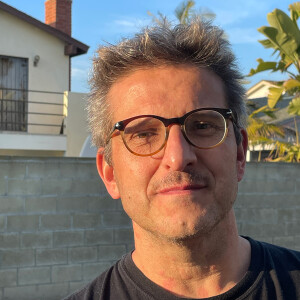
Thursday Nov 21, 2024
Thursday Nov 21, 2024
This podcast features a lecture by Piotr Florczyk, poet, essayist, translator, and professor at the University of Washington in Seattle, on the poetry of witness. This form of poetic expression testifies to extreme historical and social events—war, political persecution, exile, and even the horrors of torture and censorship.
In his talk, delivered last week in Antwerp, Florczyk explored the unique burden of the twentieth century, a time marked by unimaginable atrocities. As the number of survivors from its darkest moments, including the Holocaust, continues to dwindle, the risk of these events fading from collective memory grows. Florczyk asked: Can contemporary poets and writers engage with tragedies they know only from history books? If so, what should guide their approach? And how can they navigate accusations of exploiting or aestheticizing someone else’s suffering?
These urgent questions were at the core of Florczyk’s thought-provoking lecture, hosted by the Institute for Jewish Studies (University of Antwerp) and the Forum on Central and Eastern Europe (KU Leuven), with the support of the Polish Institute in Brussels.
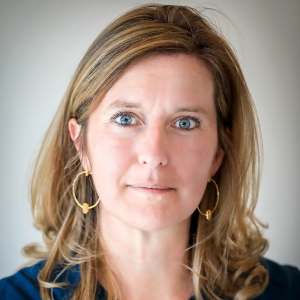
Thursday Nov 14, 2024
Thursday Nov 14, 2024
In this episode, Lien Verpoest, professor of Eastern European and diplomatic history at KU Leuven, examines why heritage has become a central issue in Russia's ongoing war in Ukraine. This topic recently took center stage at an international conference in Leuven, where representatives from 15 universities worldwide gathered to discuss EU heritage diplomacy in the war-torn region. In conversation with Peter Vermeersch, professor of political studies at KU Leuven, Verpoest explores the heritage disputes between Russia and Ukraine, highlighting the countries' contrasting views on Ukraine’s colonial and communist past. She also discusses how contested historical and identity narratives are driving both the destruction and strategic reconstruction of heritage in the region.
Lien Verpoest is the initiator and coordinator of the project HER-UKR: Challenges and opportunities for EU heritage diplomacy in Ukraine, which led by KU Leuven and co-funded by the EU.
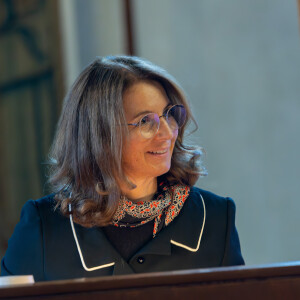
Friday Nov 08, 2024
Friday Nov 08, 2024
In this episode, Kris Van Heuckelom, Professor at KU Leuven, interviews Mirja Lecke, Chair of Slavic Literatures and Cultures at the University of Regensburg in Germany. They discuss Russian imperial literature’s portrayal of colonized territories like Poland, Lithuania, Belarus, and Ukraine—called "Western territories" to obscure their non-Russian identities. Lecke speaks of the historical evolution of Odessa’s cosmopolitan character, and the unique approach of Regensburg’s Slavic and East European Studies program, which embraces the diversity of the entire region rather than focusing solely on Russia.
Mirja Lecke participates in the project HER-UKR: Challenges and opportunities for EU heritage diplomacy in Ukraine, led by KU Leuven and co-funded by the EU.
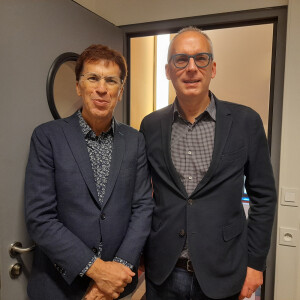
Thursday Oct 31, 2024
Thursday Oct 31, 2024
Stefan Auer, Professor of European Studies at the University of Hong Kong, and Martin Kohlrausch, Professor of European Political History at KU Leuven, discuss the systemic obstacles that prevent the European Union from responding effectively to the war in Ukraine. In this intriguing, if not entirely optimistic conversation, the two academics examine why the EU's technocratic approach falls short in times of war. They also ponder whether liberal Europe can still learn from the "dangerous mind" of Carl Schmitt—a brilliant, if morally compromised, political philosopher who aligned himself with Hitler's Nazi ideology but left behind a body of sharp political writing.
Stefan Auer participates in the project HER-UKR: Challenges and opportunities for EU heritage diplomacy in Ukraine, led by KU Leuven and co-funded by the EU.
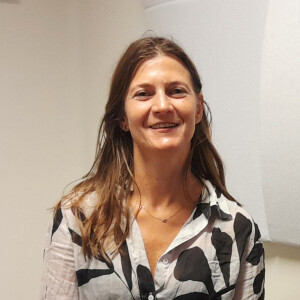
Tuesday Oct 22, 2024
Tuesday Oct 22, 2024
Art historian and curator Małgorzata Jędrzejczyk delves into the lesser-known history of the Polish avant-garde in a conversation with Martin Kohlrausch, professor of Modern European Political History at KU Leuven. Together, they explore how Poland's intellectual and artistic elite perceived their place on the European map during the 20th century. Their discussion touches on the vibrant exchange of ideas among the interwar avant-garde, while also examining the enduring notion of cultural borders separating East and West.
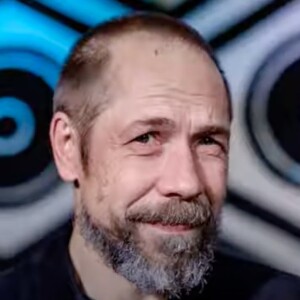
Thursday Oct 17, 2024
Thursday Oct 17, 2024
In this podcast Przemysław Czapliński, a distinguished Professor of Polish Literature and author of numerous award-winning works, explores in a highly engaging way how the economic, political, and cultural crises of the 1970s shaped Polish prose. He focuses on writers Jerzy Andrzejewski, Tadeusz Konwicki, Marek Nowakowski and Kazimierz Brandys, examining their depictions of a society grappling with the erosion of collective values and the rise of individualism—changes that set the stage for Poland's eventual shift toward capitalism. The lecture, held on 10 October 2024, was part of the MDRN lecture series and was organized with the support of the Polish Institute in Brussels.
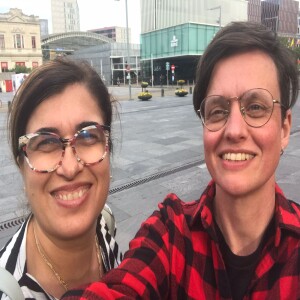
Thursday Oct 03, 2024
Thursday Oct 03, 2024
In this podcast, Olivera Simic interviews Heleen Touquet, one of the few researchers studying sexual violence against men in armed conflicts. Touquet, an associate professor at the University of Antwerp and an affiliated researcher at KU Leuven, has focused her work on the Western Balkans. In the interview, she discusses the taboo surrounding sexual violence against men and why it is often more difficult for men to speak about it than for women. Simic explores the challenges of researching this sensitive topic and draws out Touquet's insights from her many years of investigation.
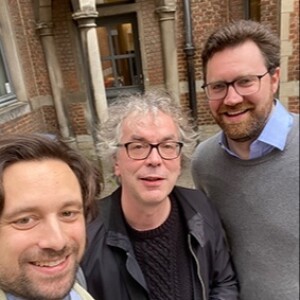
Thursday Jun 27, 2024
Thursday Jun 27, 2024
In this episode of Studio FCEE, Paul Kolb of the Alamire Music Research Foundation interviews two of KU Leuven's top musicologists. David Burn, head of the Early Music Research Group at KU Leuven, and Assistant Professor Antonio Chemotti discuss their passion for medieval music in Central Europe. They share their excitement about studying music books, prints, and manuscripts that have long been considered marginal in Western academia due to their Central European origins. Highlighting how Central Europe had simultaneous access to both very modern and complex music from important European centers and its own fascinating traditions of simpler, yet mesmerizing polyphonic works, they challenge the belief in the peripheral status of these lands in this period of history. The conversation also touches on the need for better integration of research networks among scholars working in this region and the importance of cataloguing and reconsidering the position of Central European music.
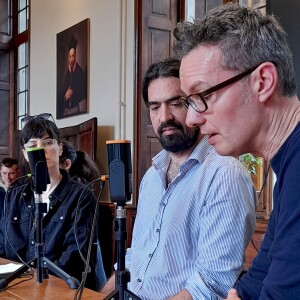
Monday Jun 24, 2024
Monday Jun 24, 2024
In this podcast, Peter Vermeersch of KU Leuven talks with architect and scholar Sabina Tanović and awarded activist and storyteller Ilir Gashi how the painful memories of the 1990s Yugoslav wars are used in contemporary commemorations, what are their meanings and uses in today's Balkan societies.
Dr. Sabina Tanović is an architect and researcher specializing in memorial projects that address traumatic histories. She earned her degree from the University of Sarajevo and holds advanced degrees from Delft University of Technology, where she also teaches. Her research focuses on the creation of modern memorials using participatory methods, environmental psychology, and the processes of bereavement. Her book, Designing Memory: The Architecture of Commemoration in Europe, 1914 to the Present (Cambridge University Press, 2019), explores the development of memorial architecture since World War I.
Between 2014 and 2017, Ilir Gashi led the Slavko Ćuruvija Foundation, championing media freedom and journalist safety in Serbia. He launched initiatives like “Cenzolovka,” a portal on media freedom, and a School of Digital Journalism for young journalists. In 2017, he co-founded the Group for Freedom of Media, uniting NGOs, independent media, and activists against government media control. Now, Gashi supports journalists and community-based NGOs across the Balkans, helping them tell their stories more effectively. His frequent travels between Belgrade and Pristina have reignited his passion for writing, inspired by the people and stories he encounters. For his piece The alternative Balkan postal system, Ilir Gashi was shortlisted for the European Press Prize.
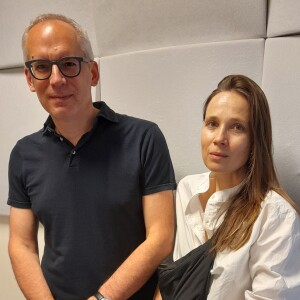
Friday Jun 07, 2024
Friday Jun 07, 2024
In this interview, KU Leuven history professor Martin Kohlrausch speaks with independent curator Anna Karpenko about the avant-garde movement between the East and the West. They discuss how avant-garde artists and architects endeavored to transcend borders and how their legacy is now subject to appropriation attempts, particularly in the post-Soviet context of the former USSR.
Anna Karpenko (b. 1985) is a curator and author. She studied philosophy at Belarusian State University (Minsk), visual studies at European Humanities University (Vilnius), and curatorial studies at the Academy of Fine Arts (Leipzig). Karpenko is a member of the International Association of Art Critics (AICA). As a curator, she has produced exhibitions and research projects with institutions such as Museum Sztuki (Lodz), Gallery Arsenal (Bialystok), Labirynth Gallery (Lublin), Badischer Kunstverein (Karlsruhe), and the Museum of Contemporary Art, GfZK (Leipzig).
As an author, her work has appeared in Springerin magazine, BLOCK magazine, Dwutygodnik, RTV magazine, Magazyn SZUM, and Kulturaustausch magazine. She also authored and edited the book When The Sun Is Low - The Shadows Are Long, published by Spector Books (Leipzig) in 2023. Though her heart belongs to Belarus (Minsk), she is currently based in Germany (Leipzig and Berlin).

The FCEE provides a multidisciplinary platform for dialogue and exploration of research on the politics, histories, societies, cultures, and institutions of 'Central and Eastern Europe' in the broadest sense. It is an initiative of the Faculties of Arts and Social Sciences of the KU Leuven. It brings together researchers from within and outside KU Leuven and initiates meaningful conversations on research-related topics.




